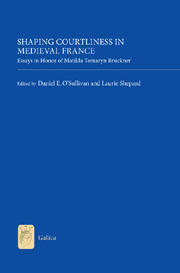Book contents
- Frontmatter
- Contents
- List of Illustrations
- Acknowledgements
- Introduction
- Matilda Tomaryn Bruckner: A Bibliography
- Part I Shaping Real and Fictive Courts
- Part II Shaping Courtly Narrative
- Part III Shaping Women's Voices in Medieval France
- Part IV Shaping the Courtly Other
- The Favorable Reception of Outsiders at Court: Medieval Versions of Cultural Exchange
- Shaping Saladin: Courtly Men Dressed in Silk
- Force de parole: Shaping Courtliness in Richard de Fournival's Bestiaire d'amours, Copied in Metz about 1312 (Oxford, Bodl. MS Douce 308)
- The Poetic Legacy of Charles d'Anjou in Italy: The Poetics of Nobility in the Comune
- Envoi
- List of Contributors
- Index
- Tabula Gratulatoria
- Already Published
The Favorable Reception of Outsiders at Court: Medieval Versions of Cultural Exchange
from Part IV - Shaping the Courtly Other
Published online by Cambridge University Press: 05 May 2013
- Frontmatter
- Contents
- List of Illustrations
- Acknowledgements
- Introduction
- Matilda Tomaryn Bruckner: A Bibliography
- Part I Shaping Real and Fictive Courts
- Part II Shaping Courtly Narrative
- Part III Shaping Women's Voices in Medieval France
- Part IV Shaping the Courtly Other
- The Favorable Reception of Outsiders at Court: Medieval Versions of Cultural Exchange
- Shaping Saladin: Courtly Men Dressed in Silk
- Force de parole: Shaping Courtliness in Richard de Fournival's Bestiaire d'amours, Copied in Metz about 1312 (Oxford, Bodl. MS Douce 308)
- The Poetic Legacy of Charles d'Anjou in Italy: The Poetics of Nobility in the Comune
- Envoi
- List of Contributors
- Index
- Tabula Gratulatoria
- Already Published
Summary
Matilda Bruckner's work on hospitality in romance inspired me to reflect on the related topic of the favorable reception of strangers at court. If hospitality is one side of the coin, a convention that requires hosts to respond favorably to those who request lodging and sustenance, the other side is what the stranger at court does, especially those behaviors that lead to court admiration, appreciation, and a warm reception. In such cases the outsider does not threaten or alienate, as one might imagine, but enhances the court by increasing its courtliness and, in turn, its prestige.
Bruckner distinguishes commercial hospitality (in which one pays for services such as lodging) from courtly hospitality (in which services are offered freely, but as part of an exchange of courtly goods and services at the heart of the feudal economy). In the courtly model, a castle lord enhances his status by offering hospitality and thereby accruing status through the act of demonstrating his wealth and largesse. The feudal economy recognizes the lord's offering as an indication of his good manners, behavior that the court expects and reads as an indicator of the lord's status and the court's prestige. The hospitality convention does not require any contribution on the part of the outsider – its purpose is to bolster the position of the lord of the castle, and it successfully fulfills that purpose.
- Type
- Chapter
- Information
- Shaping Courtliness in Medieval FranceEssays in Honor of Matilda Tomaryn Bruckner, pp. 229 - 240Publisher: Boydell & BrewerPrint publication year: 2013



